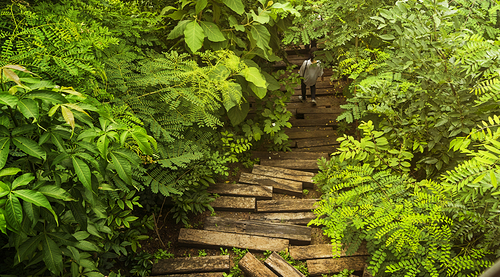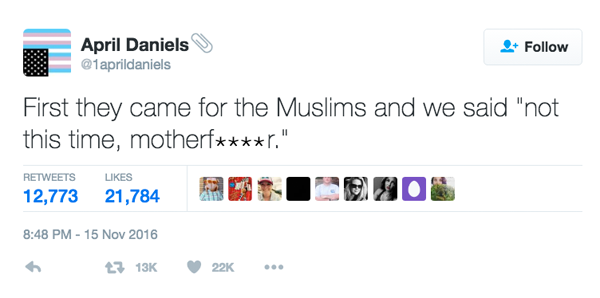So maybe this is a weird way of saying thanks
November 23, 2016

Like you, I’ve heard a lot of commentary over the last two weeks that runs the gamut from apocalyptic doom to willful optimism. The election of Donald Trump is either the worst thing that has ever happened to this country or the wake-up call we needed to save our democracy. And that encapsulates just the range of opinion from the “progressive” end of the American political spectrum. Tens of millions of Americans are still celebrating the election results, if not downright giddy over the prospects of Trump making America “great again,” but also a fair number of conservatives horrified by the results.
For what it’s worth, my own view is that Trump’s presidency probably won’t be just one thing or the other, but a mixture whose toxicity will depend on who and where you are. As a white, middle-aged heterosexual male born in the 20th century currently enjoying a decent income, relatively good health, access to resources of all kinds (yes, including fossil fuels), freedom of movement and speech, non-Obamacare health insurance, a home, loved ones, and strong support networks, I’m inordinately fortunate. Truly a 1%er. A 0.000001%er, really. I’m not more deserving than anyone else, just—thanks to arbitrary forces—ridiculously lucky. And that means, by extension, I face fewer personal threats to my well-being, safety, freedom, and opportunity than literally billions of other people (not to mention countless other species). President-elect Trump is not yet the direct source of any of those threats but, if he enacts many of his campaign promises, he could certainly increase their odds or severity.
Perhaps, like me, you count yourself among the fortunate. If you have the time, technological resources, and education sufficient to be reading this far, you are at least somewhat blessed. And compared to generations of people to come, you’re living in a time of relative climate and socio-political stability. So there’s that.
Those of us who are fortunate in one way or another have a choice—whether to take our situation for granted, feel overwhelmed by guilt, or give thanks. It took me a long time to get to a place of gratitude, and I honestly still struggle with it most of the time. The only way I can face my inexplicable fortune is to do something with it. Gratitude, for me, goes hand in hand with obligation. By sheer circumstance, I’ve been gifted with the opportunity to help others who are not so fortunate, or at least attempt to lessen the hardship they might face. I’ll be the first to admit that it’s a very selfish thing I do, and relatively easy when your own safety and well-being aren’t on the line—though that may well be tested at some point, perhaps thanks to Mr. Trump.
I don’t share this with an air of self-importance or judgment, but as a request and an invitation. If you, too, have the capacity to help—whether with time, skills, or money—you’re needed. For good or bad, there is no shortage of issues or people to support. This includes people who are on the other side of various political, cultural, gender, religious, economic, or racial divides. As Martin Luther King, Jr. said in a commencement speech at Oberlin College in 1965:
“In a real sense all life is inter-related. All men are caught in an inescapable network of mutuality, tied in a single garment of destiny. Whatever affects one directly, affects all indirectly. I can never be what I ought to be until you are what you ought to be, and you can never be what you ought to be until I am what I ought to be… This is the inter-related structure of reality.”
We may understandably feel overwhelmed, terrified, angry, despondent, depressed, or numbed by the challenges we collectively face and the massive step backwards it seems we may have just taken. Or we can feel thankful for having no shortage of purpose and some capacity to act upon that purpose.
I’m not only grateful to have means with which to act, but also deeply thankful for the amazing thinkers, leaders, resilience-builders, and like-minded folks like you whom I get to encounter through my role at Post Carbon Institute. I am not alone and neither are you. Let’s make some noise together.
Photo credit: ultramansk/Shutterstock.com.


Gratitude seems like a good basis for transition.
The Election of Trump : what is the message?
I would like to share the Vox article about the social science data regarding how voters turn towards authoritarian leaders when they are fearful. This research was based on Republican primary exit poll slick and validated questionnaires. Relatively speaking, it is not Trump that is scary , it is the state of the electorate….the fertile soil. What Trump may or may not do himself, is almost irrelevant. Nature abhors a vacuum. When the opportunity is there it will be filled ….just like genes that confer bacteria with antibiotic resistance are passed-on, when antibiotics are around.
This is why a healthy micro-biome internal environment is critical within organisms to self-regulate and adapt; within external human systems, the equivalent would be a Transition Town, kind of re-localization of our economic and governance systems to bottom up. ….re-creating local interdependent resilient economic/material capacity. This is and has always been the natural ground for community, connection, and belonging, which our brain “wiring” is adapted to, rather than ideology which is in the end, irrelevant and divisive, if it is not based on how WE are made. see : .
The history of human philosophy/ideology is full of “shoulds” or “he saids” , all of it meaningless theory (in the air = yang) without taking into account history , which is in fact a reflection of how our brains are made ( incarnated, operationally on the ground = yin). We are virtually the same creatures that lived in caves and have been for about 200,000 years.
The clear past benefits of the industrial paradigm: scale, top-down centralization, and standardization are clearly far past their optimum application, with at least somewhat un-intended side-effects of unsustainable wealth and opportunity gaps, loss of social cohesion and faith in institutions, resource depletion, and extreme weather. Accelerating incidences of hopeless “protesting-too-much” mass-kiling/suicide, opioid overdose and radicalization echo the same message. How about historic household debt? Wharehousing children in day-care and elderly in facilities? Can we consciously devolve our systems?
Re-creating self-regulating human ecosystems to which we are adapted, is the only answer to the many converging, clearly unsustainable processes in play (social, economic and environmental); they are currently approaching inflection points, i.e. “Mad Max” and collapse.
Since becoming aware that money is a very real proxy for impact, I found it hard to reconcile higher income with lower impact, environmentally. Your money has effects far beyond your control, unless you just bury it in the yard (speaking figuratively here). How can one enjoy a relatively high income without causing negative feedbacks and reverberations in an economy where the velocity of money, by its very nature, generates carbon? Just askin’…
No rationalisations, please. I found that cutting our income dramatically over the last 20 or so years has had a direct impact on our consumption; locally, and “abroad”. Risky, but not as risky as expecting to be ‘well off’, financially, while doing minimal harm. That math simply can’t work.
I agree Ken. An excellent one.
Thank you Asher.